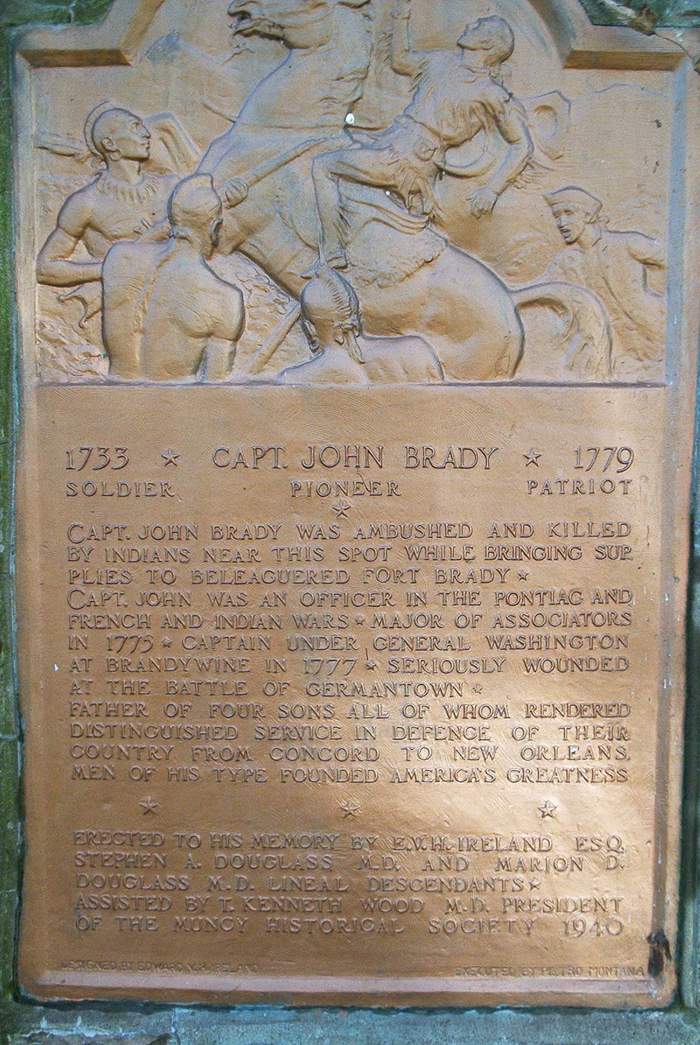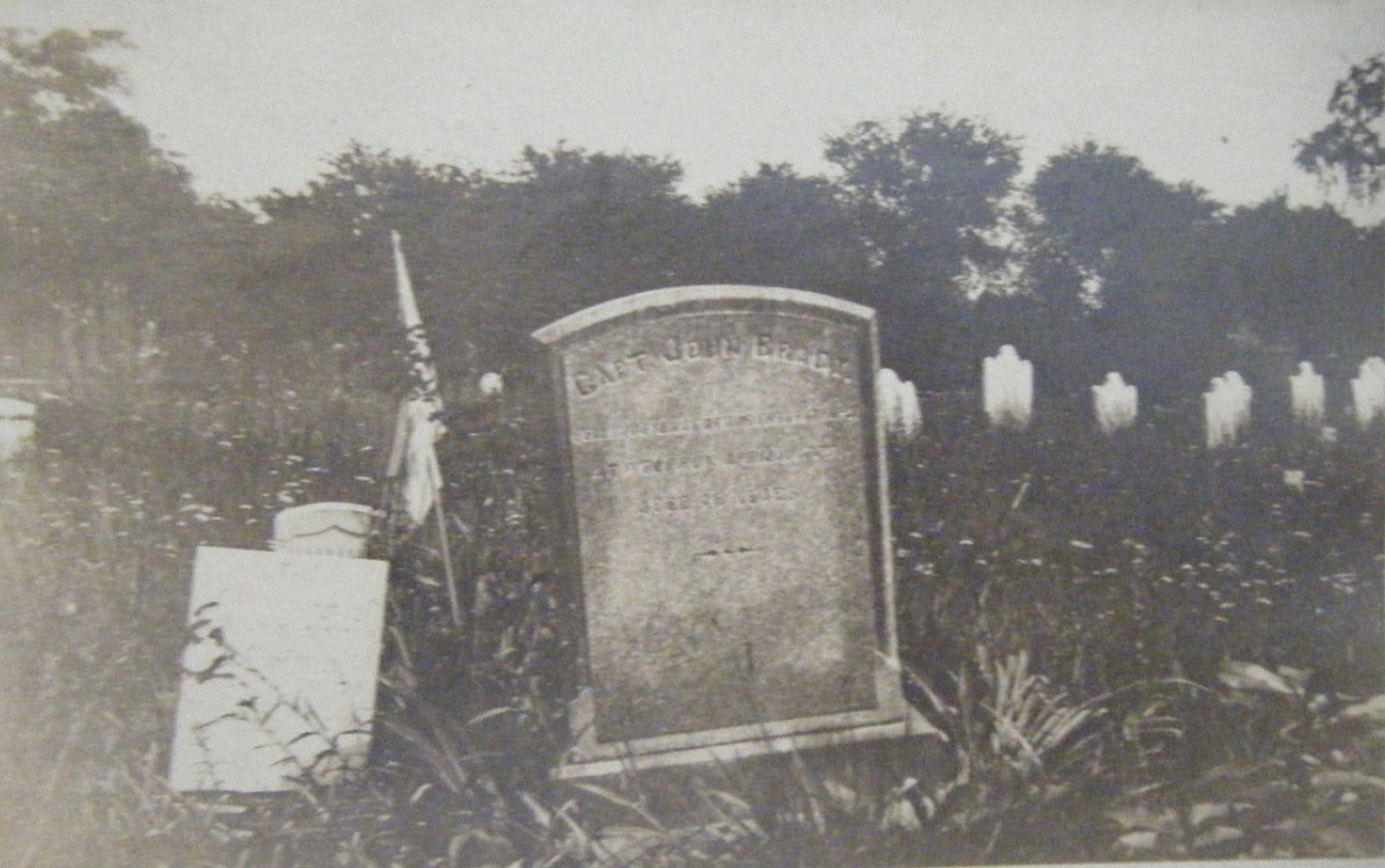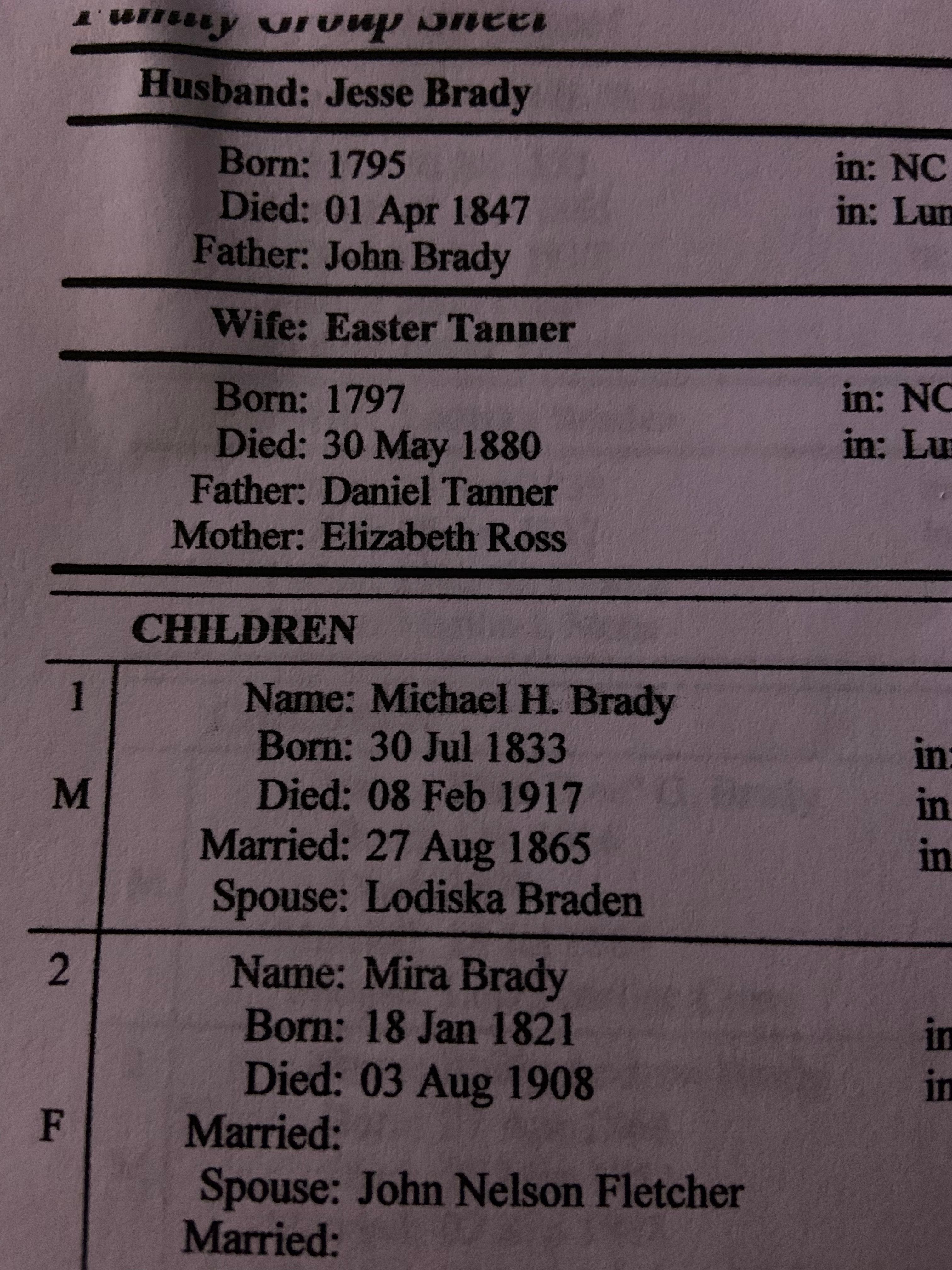and located near the mouth of Muncy Creek, was killed by the Indians, scarcely a quarter of a mile away from its protecting walls. It had become necessary to go up river some distance to procure supplies for the fort, and Captain John Brady, taking with him a wagon team and a guard, went himself and procured what could be had. On his return in the
afternoon, riding a fine mare, and within short distance of the fort, where the road forked, and being some distance behind the team and the guard, and in conversation with a man names Peter Smith, he recommended Smith not to take the road the wagon had, but the other, as it was shorter. They traveled on together, until they came near a run where the
same road joined. Brady observed, 'This would be a good place for Indians to secrete themselves.' Smith said 'Yes.' That instant three rifles cracked and Brady fell. The mare ran past Smith, who threw himself on her and was carried in a few seconds to the fort. The people in the fort heard the rifles, and seeing Smith on the mare coming at full speed, all ran to ask for Captain Brady, his wife along, or rather before the rest. Smith replied, 'In heaven or hell, or on his way to Tioga,' meaning that he was either killed or taken prisoner. Those in the fort ran to the spot and found the captain lying in the road, his scalp taken and his rifle gone; but the Indians had been in such haste that they had not taken his watch or shot-pouch. Rapine followed throughout the settlements. Isolated murders and cases of pillaging were almost numberless and larger strokes of savage fury were not infrequent. Several of these murders occurred at Fort Freeland. By May so great had become the sense of insecurity that the greater number of the people of Buffalo Valley had left. Colonel Hunter had poor successes in recruiting companies of rangers, as so many of the able-bodied men of the settlements were preparing to enter the "boat service" [the convoying of General Sullivan's commissary up the North Branch]. By the last of June he had only thirty men, exclusive of those at Fort Freeland and with General Potter, who was at Sunbury. By the late part of July the troops had all left Sunbury to join General Sullivan. Northumberland County was left in a deplorable condition, with no forces but the militia and fourteen regulars under Captain Kamplen. Almost every young man on this part of the frontier had engaged in the boat service, and the country above Muncy was completely abandoned.
Fall of Fort Freeland.-All things conspired to give the Indians opportunity for a more than usually effective blow. It was directed against Fort Freeland, and that stronghold was capture on July 28, 1779.
A number of British officers and soldiers were with the besieging party, the advance portion of which made it appearance on the 21st. The whole force consisted of about three hundred men. Colonel Hunter writes upon
the 28th,-
"This day, about twelve o'clock, an express arrived from Captain Boone's mill, informing us that Freeland's Fort was surrounded; and, immediately after, another express came, informing us that it was burned and all the garrison either killed or taken prisoner; the party that went from Boone's saw a number of Indians and some red-coats walking
around the fort, or where it had been. After that, firing was heard off towards Chillisquaque. Parties are going off from this town and from Northumberland for the relief of the garrison. General Sullivan would send us no assistance, and our neighboring counties have lost the virtue they were once possessed of, otherwise we should have some relief before
this. I write in a confused manner. I am just marching off, up the West Branch, with a party I have collected."
A few days before the capture, Robert Covenhaven went up as far as Ralston (now), where he discovered Colonel McDonald's party in camp. He returned to Fort Muncy (Fort Penn) and gave the alarm. The women and children were then put in boats and sent down, under his charge, to Fort
Augusta. He took with him the families at Fort Meninger, at the mouth of Warrior's Run; but Freeland's Fort being four and a half miles distant, they had no time to wait for the families there, but sent a messenger to
alarm them.
****************************************
His body was brought to the fort and soon after interred in the Muncy burying ground, some four miles from the fort (now Hall's station, P. & E. R. B.) over Muncy creek." His grave is suitably marked at Hall's, while a cenotaph in the present Muncy cemetery of thirty feet high, raised by J. M. M. Gernerd by dollar subscription, attests the lively interest still felt by the community in one who devoted himself to the protection of the valley when brave active men and good counselors were needed. Of his sons, Capt. Samuel Brady, a sharpshooter of Parr's and Morgan's rifles, fought on almost every battlefield of the Revolution, from Boston and Saratoga to Germantown, can speak of his deeds as a scout and Indian fighter Western and Northern Pennsylvania, which West Virginia and Ohio attest. To the Indian he became a terror, and he fully avenged the blood of his sire shed at Wolf run, on the West Branch of the Susquehanna, that beautiful day in April, 1779, at the bloody fight of Brady's Bend, on the Allegheny, where, with his own hand, he slew his father's murderer and avenged his brother James, the "Young Captain of the Susquehanna," in a hundred other fights. Of his second son, James, killed by the Indians at the Loyal Sock, whose career bid fair to be as brilliant as his elder brother's but unfortunately cut off at his commencement. John, who, when but a boy of fifteen, going with his father and oldest brother to the battlefield of the Brandywine to bring back the horses, finding a battle on hand, took a rifle and stepped into the ranks and did manful duty, and was wounded. He is said to have served with Jackson at New Orleans in the War of 1812. William Perry Brady served on the northern borders in the same war, and at Perry's victory at Lake Erie, when volunteers were called, was the first to step out.
Hon. John Blair Linn, at the dedication of the Brady monument in 1879, one hundred years after the death of John Brady, said: "To the valley his loss was well, nigh irreparable; death came to its defender, and ‘Hell followed hard after. In May, Buffalo Valley was overrun and the people left, on the 8th of July Smith's mills, at the mouth of the White Deer Creek were burned, and on the 17th Muncy valley was swept with the besom of destruction. Starrett's mills and all the principal houses in Muncy township burned, with Fort Muncy, Brady and Freeland, and Sunbury became the frontier."
"History of that part of the Susquehanna and Juniata Valleys, Embraced in the Counties of Mifflin, Juniata, Perry, Union and Snyder In The Commonwealth of Pennsylvania." In Two Volumes, Vol 1 Philadelphia:
EVERTS, PECK & RICHARDS 1886, pp 97-99
He was married to Mary Quigley . Parents of 4 sons: Samuel Brady
James
John
William
and located near the mouth of Muncy Creek, was killed by the Indians, scarcely a quarter of a mile away from its protecting walls. It had become necessary to go up river some distance to procure supplies for the fort, and Captain John Brady, taking with him a wagon team and a guard, went himself and procured what could be had. On his return in the
afternoon, riding a fine mare, and within short distance of the fort, where the road forked, and being some distance behind the team and the guard, and in conversation with a man names Peter Smith, he recommended Smith not to take the road the wagon had, but the other, as it was shorter. They traveled on together, until they came near a run where the
same road joined. Brady observed, 'This would be a good place for Indians to secrete themselves.' Smith said 'Yes.' That instant three rifles cracked and Brady fell. The mare ran past Smith, who threw himself on her and was carried in a few seconds to the fort. The people in the fort heard the rifles, and seeing Smith on the mare coming at full speed, all ran to ask for Captain Brady, his wife along, or rather before the rest. Smith replied, 'In heaven or hell, or on his way to Tioga,' meaning that he was either killed or taken prisoner. Those in the fort ran to the spot and found the captain lying in the road, his scalp taken and his rifle gone; but the Indians had been in such haste that they had not taken his watch or shot-pouch. Rapine followed throughout the settlements. Isolated murders and cases of pillaging were almost numberless and larger strokes of savage fury were not infrequent. Several of these murders occurred at Fort Freeland. By May so great had become the sense of insecurity that the greater number of the people of Buffalo Valley had left. Colonel Hunter had poor successes in recruiting companies of rangers, as so many of the able-bodied men of the settlements were preparing to enter the "boat service" [the convoying of General Sullivan's commissary up the North Branch]. By the last of June he had only thirty men, exclusive of those at Fort Freeland and with General Potter, who was at Sunbury. By the late part of July the troops had all left Sunbury to join General Sullivan. Northumberland County was left in a deplorable condition, with no forces but the militia and fourteen regulars under Captain Kamplen. Almost every young man on this part of the frontier had engaged in the boat service, and the country above Muncy was completely abandoned.
Fall of Fort Freeland.-All things conspired to give the Indians opportunity for a more than usually effective blow. It was directed against Fort Freeland, and that stronghold was capture on July 28, 1779.
A number of British officers and soldiers were with the besieging party, the advance portion of which made it appearance on the 21st. The whole force consisted of about three hundred men. Colonel Hunter writes upon
the 28th,-
"This day, about twelve o'clock, an express arrived from Captain Boone's mill, informing us that Freeland's Fort was surrounded; and, immediately after, another express came, informing us that it was burned and all the garrison either killed or taken prisoner; the party that went from Boone's saw a number of Indians and some red-coats walking
around the fort, or where it had been. After that, firing was heard off towards Chillisquaque. Parties are going off from this town and from Northumberland for the relief of the garrison. General Sullivan would send us no assistance, and our neighboring counties have lost the virtue they were once possessed of, otherwise we should have some relief before
this. I write in a confused manner. I am just marching off, up the West Branch, with a party I have collected."
A few days before the capture, Robert Covenhaven went up as far as Ralston (now), where he discovered Colonel McDonald's party in camp. He returned to Fort Muncy (Fort Penn) and gave the alarm. The women and children were then put in boats and sent down, under his charge, to Fort
Augusta. He took with him the families at Fort Meninger, at the mouth of Warrior's Run; but Freeland's Fort being four and a half miles distant, they had no time to wait for the families there, but sent a messenger to
alarm them.
****************************************
His body was brought to the fort and soon after interred in the Muncy burying ground, some four miles from the fort (now Hall's station, P. & E. R. B.) over Muncy creek." His grave is suitably marked at Hall's, while a cenotaph in the present Muncy cemetery of thirty feet high, raised by J. M. M. Gernerd by dollar subscription, attests the lively interest still felt by the community in one who devoted himself to the protection of the valley when brave active men and good counselors were needed. Of his sons, Capt. Samuel Brady, a sharpshooter of Parr's and Morgan's rifles, fought on almost every battlefield of the Revolution, from Boston and Saratoga to Germantown, can speak of his deeds as a scout and Indian fighter Western and Northern Pennsylvania, which West Virginia and Ohio attest. To the Indian he became a terror, and he fully avenged the blood of his sire shed at Wolf run, on the West Branch of the Susquehanna, that beautiful day in April, 1779, at the bloody fight of Brady's Bend, on the Allegheny, where, with his own hand, he slew his father's murderer and avenged his brother James, the "Young Captain of the Susquehanna," in a hundred other fights. Of his second son, James, killed by the Indians at the Loyal Sock, whose career bid fair to be as brilliant as his elder brother's but unfortunately cut off at his commencement. John, who, when but a boy of fifteen, going with his father and oldest brother to the battlefield of the Brandywine to bring back the horses, finding a battle on hand, took a rifle and stepped into the ranks and did manful duty, and was wounded. He is said to have served with Jackson at New Orleans in the War of 1812. William Perry Brady served on the northern borders in the same war, and at Perry's victory at Lake Erie, when volunteers were called, was the first to step out.
Hon. John Blair Linn, at the dedication of the Brady monument in 1879, one hundred years after the death of John Brady, said: "To the valley his loss was well, nigh irreparable; death came to its defender, and ‘Hell followed hard after. In May, Buffalo Valley was overrun and the people left, on the 8th of July Smith's mills, at the mouth of the White Deer Creek were burned, and on the 17th Muncy valley was swept with the besom of destruction. Starrett's mills and all the principal houses in Muncy township burned, with Fort Muncy, Brady and Freeland, and Sunbury became the frontier."
"History of that part of the Susquehanna and Juniata Valleys, Embraced in the Counties of Mifflin, Juniata, Perry, Union and Snyder In The Commonwealth of Pennsylvania." In Two Volumes, Vol 1 Philadelphia:
EVERTS, PECK & RICHARDS 1886, pp 97-99
He was married to Mary Quigley . Parents of 4 sons: Samuel Brady
James
John
William
Family Members
Advertisement
Records on Ancestry
Advertisement
























